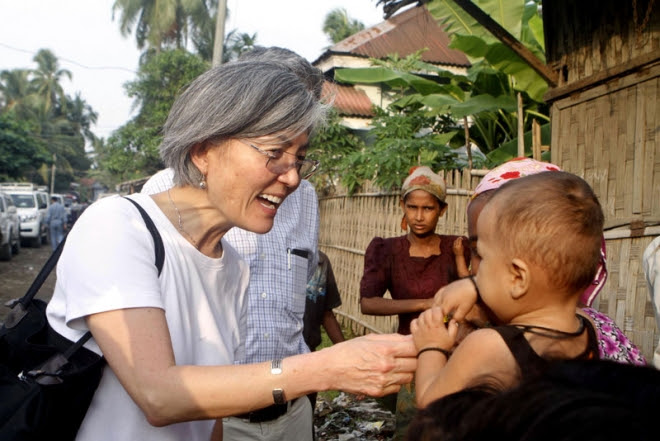The UN Assistant Secretary-General for Humanitarian Affairs, Kyung-wha Kang, meets a young member of the Muslim community in the Rakhine State capital, Sittwe, on June 11. During her visit to Rakhine, Ms Kang, who is also the UN's deputy emergency relief coordinator, visited camps housing internally displaced persons as well as communities affected by communal violence. She also visited an IDP camp in Kachin State during her visit to Myanmar. Photo: Nyunt Win/EPA

The United Nations Deputy Emergency Relief Coordinator has stressed the need for improved access to people in need of humanitarian assistance in Myanmar and has described conditions in a camp for internally displaced persons in Rakhine State as “appalling”.
Ms Kyung-wha Kang said on June 13 that despite progress in Myanmar’s reform process in recent years, humanitarian conditions “have deteriorated in some areas where people are in greatest need, but where access continues to pose a challenge”.
Ms Kang, who is also the UN’s Assistant Secretary-General for Humanitarian Affairs, was speaking at the end of a visit that included trips to Rakhine and Kachin states.
In a news release issued by the UN Office for the Coordination of Humanitarian Affairs, Ms Kang said she saw the serious challenges that humanitarian workers face in delivering aid to the estimated 421,000 people in urgent need of assistance in the two states.
In Rakhine, she travelled to the state capital, Sittwe, and Pauktaw to visit camps for IDPS and host communities affected by inter-communal violence.
Ms Kang described as “appalling” the situation she saw in NgetChaung IDP camp, where access to basic services such as health, education, water and sanitation was “wholly inadequate”, the OCHA news release said.
It said that during her visit to Rakhine she met local authorities, community leaders and humanitarian workers to evaluate progress in resuming and scaling up aid programs after the attacks on offices and warehouses used by the UN and non-government organisations in Sittwe in March.
The current capacity of the humanitarian community in Rakhine is still less than 60 percent, the OCHA released quoted her as saying.
“The safety and security of our staff, both national and international, must be guaranteed in order for the UN and NGOs to continue to support the Myanmar Government in responding to the vast humanitarian and development needs of all the people in RakhineState,” Ms Kang said.
She also visited IDP camps in KachinState, where communities recently marked the third anniversary of fighting between the Kachin Independence Army and the Myanmar Army, which has displaced more than 100,000 people.
About half of these IDPs, including women and children, live in camps in areas outside government control where access by humanitariansorganisations is limited.
“Local NGOs have been, and will continue to be, central to the humanitarian response in Kachin, but more regular, predictable, and sustained access by international organisations is needed to reach the required levels of assistance in all IDP areas,” Ms Kang said.
During her visit, Ms Kang also held talks with government ministers in Nay Pyi Taw during which she reiterated the UN’s continued commitment to support the Government in responding to humanitarian needs in Myanmar.
The OCHA release said Ms Kang reminded the authorities of their responsibility to ensure that justice is rendered and that the perpetrators of the March attacks in Sittweare brought to justice.



